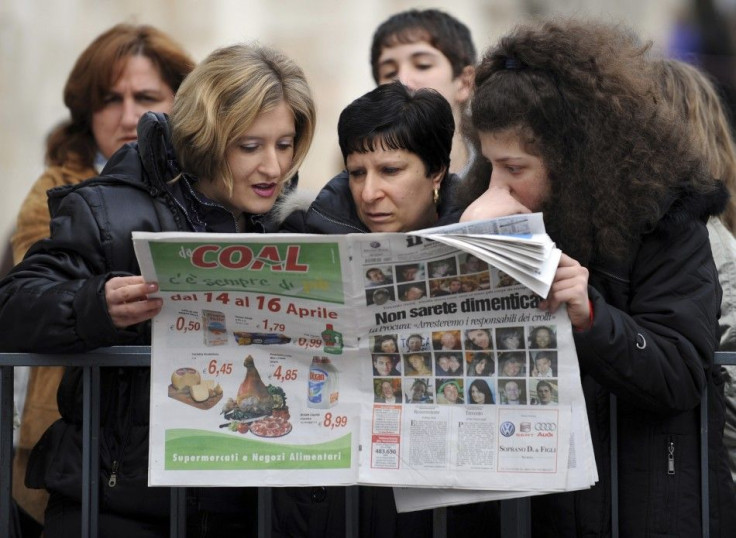Italian Earthquake Manslaughter Trial Could Chill Scientist-Government Relations

Italy’s not always an easy place to be a scientist: just ask Galileo. Now, about 400 years after the Roman Inquisition held a hearing on heliocentrism, a different Italian court has sentenced six Italian scientists and a government official to six years in prison for manslaughter. The alleged weapon? Falsely reassuring statements about earthquake risk.
Now scientists across the globe say that the ruling is anti-science, and worry that the Italian court’s ruling may have a ‘chilling effect’ on researchers, making them skittish about offering their advice to governments on natural disasters.
In April 2009, a 6.3-magnitude earthquake struck the town of L’Aquila. 308 people were killed, 1,600 were injured and more than 65,000 were left homeless.
The L’Aquila earthquake came after tremors and less powerful earthquakes were recorded in the region. A man named Giampaolo Giuliani had predicted an earthquake in late March of that year, using his own method involving measuring levels of radon gas emitted by rocks. The method is not accepted by most scientists, and Giuliani has struggled to find funding in his native land.
Soon after Giuliani’s earthquake failed to materialize in March, a scientific advisory panel called the Major Risks Committee held a meeting to assess the probability of a big quake in the region. At the meeting, none of the scientists completely dismissed the possibility of a big quake, but said that one was ‘unlikely,’ according to minutes obtained by Nature.
But after the meeting, Civil Protection Agency official Bernardo De Bernardinis told reporters that the scientists told him "there is no danger because there is an ongoing discharge of energy” and that "the situation looks favorable," according to the Guardian.
There was the heart of the case: some locals said that they had been considering leaving their homes, but stayed put after the statement. A year after the quake, De Bernardinis and six scientists from that committee were charged with manslaughter.
Alan Leshner, the CEO and executive publisher of the journal Science, expressed deep concerns about the case in a letter to Italian president Giorgio Napolitano in June.
“Years of research, much of it conducted by distinguished seismologists in your own country, have demonstrated that there is no accepted scientific method for earthquake prediction that can be reliably used to warn citizens of an impending disaster. To expect more of science at this time is unreasonable,” Leshner wrote.
When the scientists were first charged, the American Geophysical Union condemned the court’s treatment of their colleagues. The AGU said the case could “harm international efforts to understand natural disasters and mitigate associated risk, because risk of litigation will discourage scientists and officials from advising their government or even working in the field of seismology and seismic risk assessment.”
Now with the ruling in, the AGU’s prediction seems to be coming true. The head of the Major Risks Committee, Luciano Maiami, resigned in protest on Tuesday along with several other scientists.
"It is impossible to produce serious, professional and disinterested advice under this mad judicial and media pressure. This sort of thing doesn't happen anywhere else in the world," Maiami told Agence-France-Presse. "This is the end of scientists giving consultations to the state."
“Scientists need to be able to share what they know—and admit what they do not know—without the fear of being held criminally responsible should their predictions not hold up,” Michael Halpern of the Union of Concerned Scientists wrote in a blog post.
The ruling does seem to encourage a broad definition of manslaughter in Italy. Could meteorologists now be prosecuted over flawed weather predictions? Could epidemiologists rack up manslaughter charges for failing to control the spread of some new flu virus?
The Italian scientists will have two chances to appeal the verdict. In the meantime, many scientists are saying the trial distracts from the real infrastructural causes of the disaster.
As geophysicist Dario Albarello told the AFP: "It is not earthquakes that kill, it's badly built buildings that collapse.”
© Copyright IBTimes 2025. All rights reserved.




















